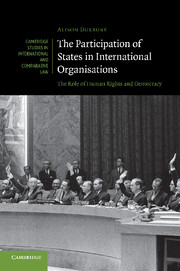Book contents
- Frontmatter
- Contents
- Foreword
- Acknowledgements
- Table of cases
- Table of treaties
- List of abbreviations
- Introduction
- 1 The move to institutions in the age of rights
- 2 The challenge of universality – the League of Nations and the United Nations
- 3 Rights, regionalism and participation in Europe
- 4 Restricting the ranks – excluding states from closed organisations
- 5 The relationship between powers, purposes and participation in specialised organisations
- 6 Legitimacy, democracy and membership
- Conclusion
- Select bibliography
- Index
- CAMBRIDGE STUDIES IN INTERNATIONAL AND COMPARATIVE LAW
- References
Introduction
Published online by Cambridge University Press: 01 March 2011
- Frontmatter
- Contents
- Foreword
- Acknowledgements
- Table of cases
- Table of treaties
- List of abbreviations
- Introduction
- 1 The move to institutions in the age of rights
- 2 The challenge of universality – the League of Nations and the United Nations
- 3 Rights, regionalism and participation in Europe
- 4 Restricting the ranks – excluding states from closed organisations
- 5 The relationship between powers, purposes and participation in specialised organisations
- 6 Legitimacy, democracy and membership
- Conclusion
- Select bibliography
- Index
- CAMBRIDGE STUDIES IN INTERNATIONAL AND COMPARATIVE LAW
- References
Summary
International organisations are increasingly promoting human rights and democratic governance as principles relevant in deciding applications for admission by non-member states. In the 1990s the importance of these standards was underlined by suggestions that a state's membership of institutions such as the United Nations and its involvement in regional security measures should be based on adherence to certain fundamental values, including democracy. Not only have human rights and democracy norms been utilised in determining the admission of a potential member to an international organisation, but they have also been taken into account in resolving the question of whether existing members, or their representatives, should be excluded from an organisation's processes. Such determinations have been made in the Commonwealth, the Organization of American States and in decisions to deny accreditation to delegations in the General Assembly of the United Nations. When organisations have ignored these principles in their membership policies, their choices have been criticised – as was the case when the Association of Southeast Asian Nations admitted Burma in 1997.
In listing these examples, the impression may be given that the practice of requiring potential applicants, as well as existing members of an organisation, to fulfil certain human rights and democracy criteria is a recent development. However, it would be a mistake to regard this practice as a phenomenon of the last decade of the twentieth century and the first decade of this century exclusively.
- Type
- Chapter
- Information
- The Participation of States in International OrganisationsThe Role of Human Rights and Democracy, pp. 1 - 12Publisher: Cambridge University PressPrint publication year: 2011



